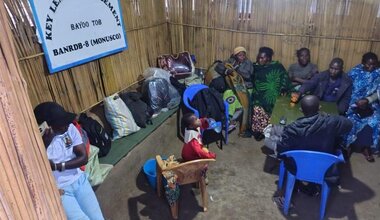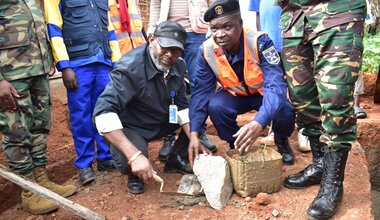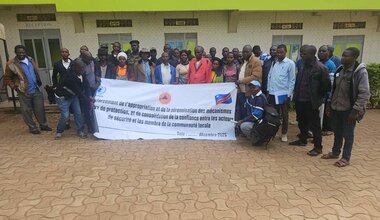In Beni, MONUSCO encourages citizens' participation in responding to security challenges
"Mulekera is a hot commune". It is with these words that Ben Kawa starts out talking about his commune. He was born there. He grew up there. He lives there. "All the citizen movements started in Mulekera. All the big demonstrations in the city also start from there", explains the young man, shaved head, jovial face ever wearing an optimistic smile that hardly hides his hyperactivity.
A journalist, Ben Kawa was, between 2019 and 2021, president of the youth of this commune of the city of Beni. Currently, he is a member of the local protection committee of Mulekera. It is in this capacity that he participated in the work of developing the local action plan for security of this commune, last May.
The process was initiated by the Civil Affairs section of MONUSCO. Imagine the mayor of a commune and his deputy, the local police commander, all the neighborhood chiefs and their deputies, representatives of civil society, youth, women's associations, citizens' movements, pressure groups, members of the employers' association (FEC), and people living with disabilities, all gathered in the same room to discuss what should be done to ensure the security of the inhabitants of their commune.
"Sometimes, tempers have flared," confides Ben Kawa. Who could have imagined the opposite. Getting lobbyists and local authorities to sit around the table was a challenge. All these actors met, first of all, to make a diagnosis. It was not easy. Citizen movements and pressure groups regularly accuse the authorities of doing nothing to secure the commune. MONUSCO's objective was to bring citizens and local authorities together to discuss this issue face-to-face. "Urban banditry is a reality in Mulekera," explains Ben Kawa, for whom this initiative was welcome: "When there are exchanges like this, it allows us to identify the real problems and their causes.
The journalist reveals that among the points raised by citizens during the diagnosis to explain the increase in the number of burglaries in this commune, there are the difficulties of access. All the rivers in Beni pass through Mulekera. However, there is no bridge for easy access. This makes it very difficult for interventions to arrive. As a result, demonstrations against insecurity sometimes turn violent in the city. Thus for Ben Kawa, such "exchanges should take place regularly. This would make it possible to curb certain behaviors".
"Participatory governance"
The journalist is pleased that on June 7 during the validation of the local action plan for security of his town, the proposals of citizens were retained. In addition to geographical accessibility, the issues of closing hemp selling points and ending the "roaming" of armed soldiers and police officers are also included in the plan
For the mayor of the "hot" commune of Mulekera, this exercise is part of "participatory governance". "You can set up a plan, have a project, if there is no participation of the population, it is difficult for the project to succeed. It is necessary that, on both sides, we authorities and the population, can come together, think together to come up with a plan like this one so that everyone knows that they have contributed at a certain level and the applicability will not be a problem. This is part of participatory governance. Everyone must contribute to building our community," notes Senior Commissioner Dieudonné Ngongo.
Like Ben Kawa, the police officer is optimistic. He believes that if everyone does their part, the plan should enable the commune of Mulekera to regain its tranquility. After signing the minutes validating the plan in the presence of a decentralization expert, each group committed to doing its part.
This exercise was also carried out in the three other communes of the city of Beni (Bungulu, Ruwenzori and Beu). The plans will be sent to the city's mayor and the provincial governor. According to MONUSCO, one of the objectives of this initiative is to improve relations between local authorities and residents, particularly on security issues.
Long before this new initiative, the UN mission's Civil Affairs section had already facilitated the establishment of local security councils in each commune of Beni. Like Ben Kawa, the members of these committees play a watchdog role. They warn local authorities and the police at the slightest security threat to request an intervention.

 UN
UN United Nations Peacekeeping
United Nations Peacekeeping






